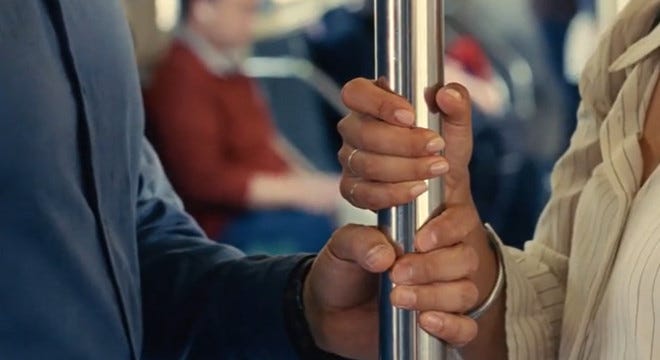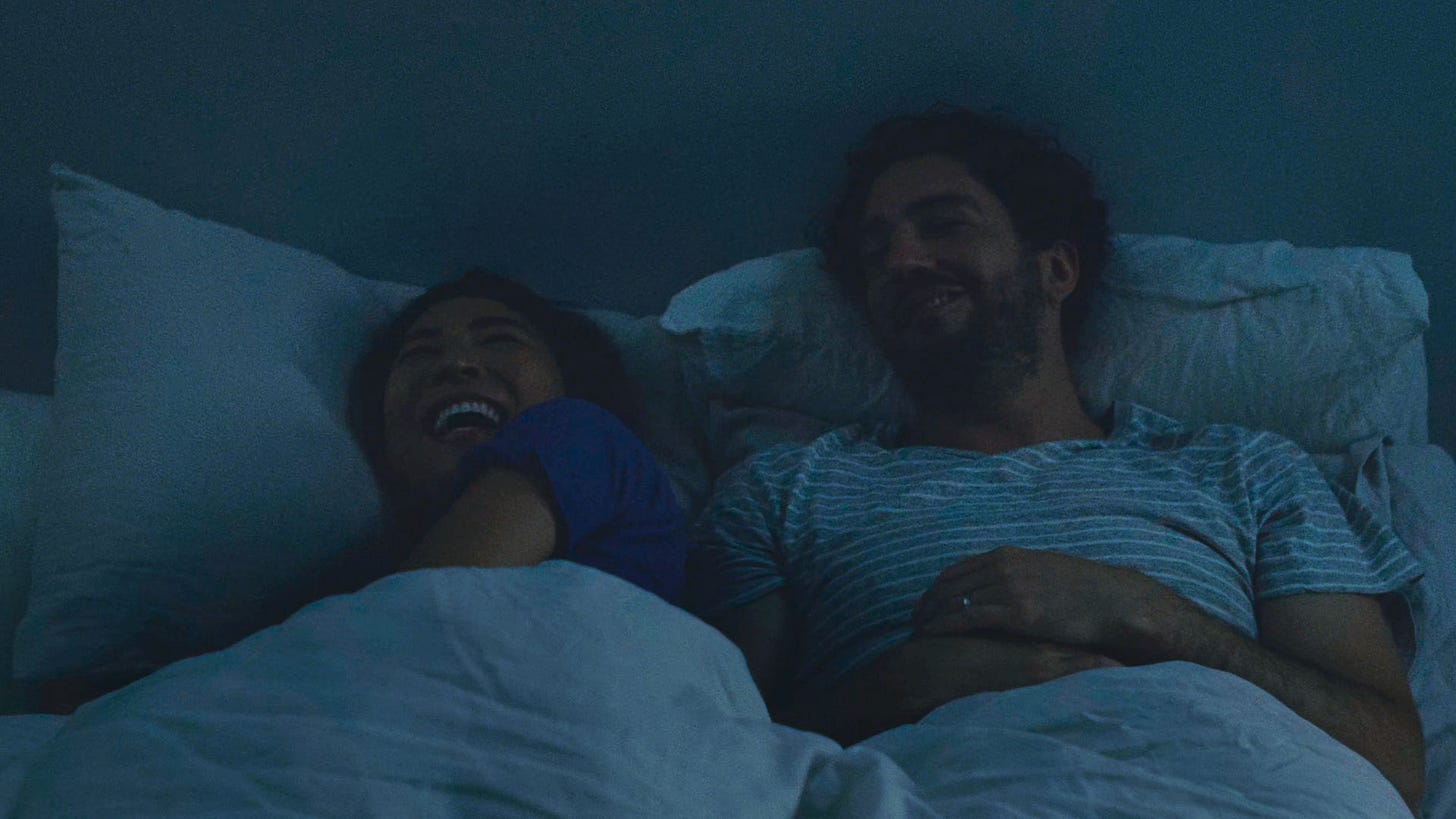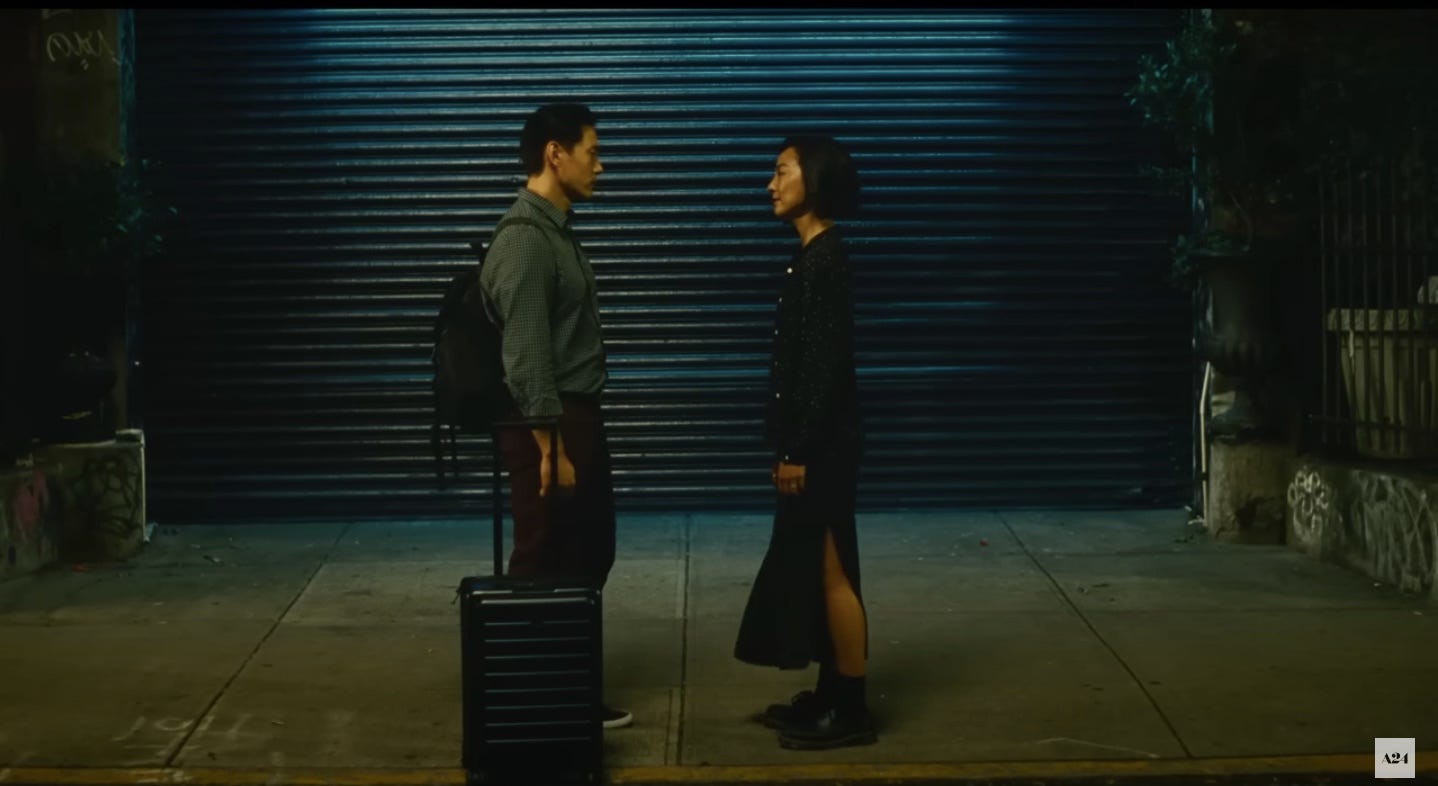The opening scene of the film has the camera pan into three people at a bar - an Asian man and woman, and a white man, slightly aloof from the rest - with a couple of patrons debating offscreen the relationship the three of them share with one another. All their guesses are wrong because their relationship with one another is undefined, even to their own selves. This film really isn’t about it’s characters, or about their lives, and neither is it about their relationship with one another. Rather it’s about a philosophy, one that pulls you into the cinematic universe of this film, and of your life, only to bring you right back to this first scene by the end. Its a story of choices and everything we gain and lose in the process.
When Na Young and Hae Sung meet for the very last time as twelve year olds, neither knows that it’ll be twelve more before they speak again or that Na Young is shedding this life of hers and stepping into that of Nora’s. As Na Young walks up and away into Nora, the white-washed immigrant identity that will begin to define her, she doesn’t know all the fork paths she will have to reckon with for decades to come. As she stumbles into adulthood, Nora is torn between the culture she inherits and the one she integrates into, between her first love and her husband. She finds her identity and life fractured between the life she knew and the life she knows now, between all the almosts and what-ifs of her life.
Over a decade later, when Na Young tries looking up Hae Sung on Facebook as a joke, after some difficulty recollecting his name at first, he’d already been looking for her. When they begin to rekindle their friendship, there’s a burning desire for it to be something more but this time they’re separated by seven seas and the boundaries of their present lives. As the distance between them becomes too much to bear, Nora cuts off contact to focus on her career. And yet again, neither knows that it’ll be twelve more years before they meet again.
At their first meeting, Nora introduces Arthur, her soon to be husband, to the Korean philosophy of in-yeon - the idea that every relationship one encounters in their lifetime, no matter how briefly, is orchestrated by the strings of destiny through eight thousand lifetimes. While Nora and Hae Sung’s persistent dance in and out of their respective lives might seem like a classic case of right person, wrong time, it is this very notion that Celine Song attempts to challenge through the lives of her characters. In a way, she almost broaches the idea that it is in-yeon that has brought you to this very moment of watching this film, of walking beside Nora and Hae Sung as they shed their past lives.
When Hae Sung finally visits New York yet another dozen years after they last spoke, he comes looking for Na Young. With Nora now married to Arthur and Hae Sung processing fresh heartbreak, Hae Sung begins to reckon with the what-ifs of life.
What if they never stopped speaking twelve years ago? What if Nora never met Arthur, or left Korea? What if they lived out their childhood romantic fantasies and got married, or had kids even?
What if you struck up a conversation with the stranger at the café? What if you fought harder for that friendship? What if you didn’t? What if you had a different career, a different life, a different name even?
What if, what if, what if?
But even when they’re together, finally, they’re still apart. Like how when they’re on the train clutching a pole, there is this liminal space between their hands and beings. They’re always almost meeting but never quite, always looking opposite ways. There’s a delicate rhythm to this dance of absence and distance that tugs at them. The tension is palpable to them, as well as to you.
While Hae Sung roams the streets of New York looking for Na Young, skyscrapers as tall as the enormity of their own past lives, he realises that Na Young will forever remain twelve, immortalised in his heart alone. They don’t want the same things anymore, maybe they never did. He wants more from her and his own life while Nora is content in the life she’s built for herself. Even as she stands in the midst of her past and present, she never wishes to drag her past into the future. She’s happy moving forward in the present. In that sense, this film is about her past and present getting to know her better rather than her making attempts at any reconciliation with these realities.
As Nora spends more time with Hae Sung, Arthur’s jealousy begins to fill the tiny apartment he shares with Nora. The writer in him recognises a good story when he sees one, Nora and Hae Sung’s love story is a flawless script that pales in comparison to his seemingly ordinary love story. For a brief moment he wonders where he figures in Nora’s life, if she loves him, if their love story even makes for a good one.
This movie doesn't have any big, grand moments. There are only these small pockets in which a feeling dawns upon you and breaks you ever so softly. When Arthur tells Nora she dreams in Korean, it hits you, breaks you even, that there are places inside of us, deep deep inside, that our lovers - romantic, platonic and every shade in between - will never get to visit. Maybe we don't either.
You dream in a language i can't understand. It's like there's this whole place inside of you where i can't go.
Maybe if we stepped aside from our grief, from the hustle bustle of life, we'd see what a miracle it is to be able to live this life, to love and to be loved. How many layers we've peeled away from ourselves, across several lifetimes, just to be with one another. how out of the millions of different versions that were ever possible of our lives, this is the life we've been gifted and these are the loves we get to hold close to us, to walk the rest of our lives with.
Past Lives is a story of love and choices - the ones we make or don’t. It may seem like we’re steering our own lives. But are we really? Or are we all just steered by providence instead? Must we always lose something to gain another thing? How do we make peace with all the almosts and what-ifs, all the fork paths we find ourselves kneeling before? Perhaps this is what life is all about - we’re here now and this is all we’ve got left with us. We can only believe that these invisible strings of destiny will ultimately bring us ashore and it’ll be a good one.
As Nora and Hae Sung part ways, they linger uncomfortably beside each other. The time they have left with one another is so long and yet so brief. The time we have left with another is just as long, just as brief too. We’re all here together, lingering in this liminal space, in a fragment of time and this is in-yeon. It’s just as Arthur and Hae Sung realise sitting at the bar - them sitting together in this lifetime, to have crossed paths at all, is in-yeon. This is their only chance at living and loving and they must make peace with it, as should we.







"Maybe if we stepped aside from our grief, from the hustle bustle of life, we'd see what a miracle it is to be able to live this life, to love and to be loved. How many layers we've peeled away from ourselves, across several lifetimes, just to be with one another. how out of the millions of different versions that were ever possible of our lives, this is the life we've been gifted and these are the loves we get to hold close to us, to walk the rest of our lives with."
Thank you for putting into words all of the Big Feelings this film has left me with. I loved this review, and have shared with the friends who were moved by Past Lives! As always, I'm in awe of your writing. <3 Time for a Past Lives rewatch now!